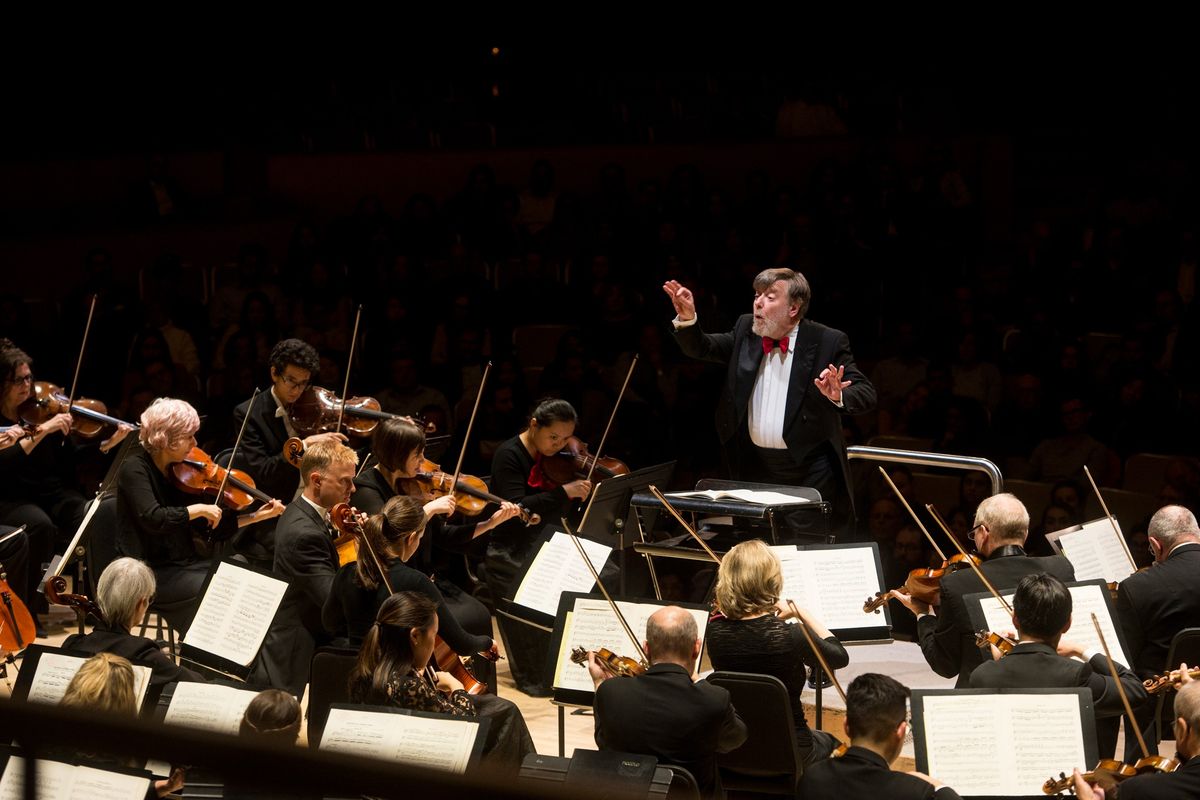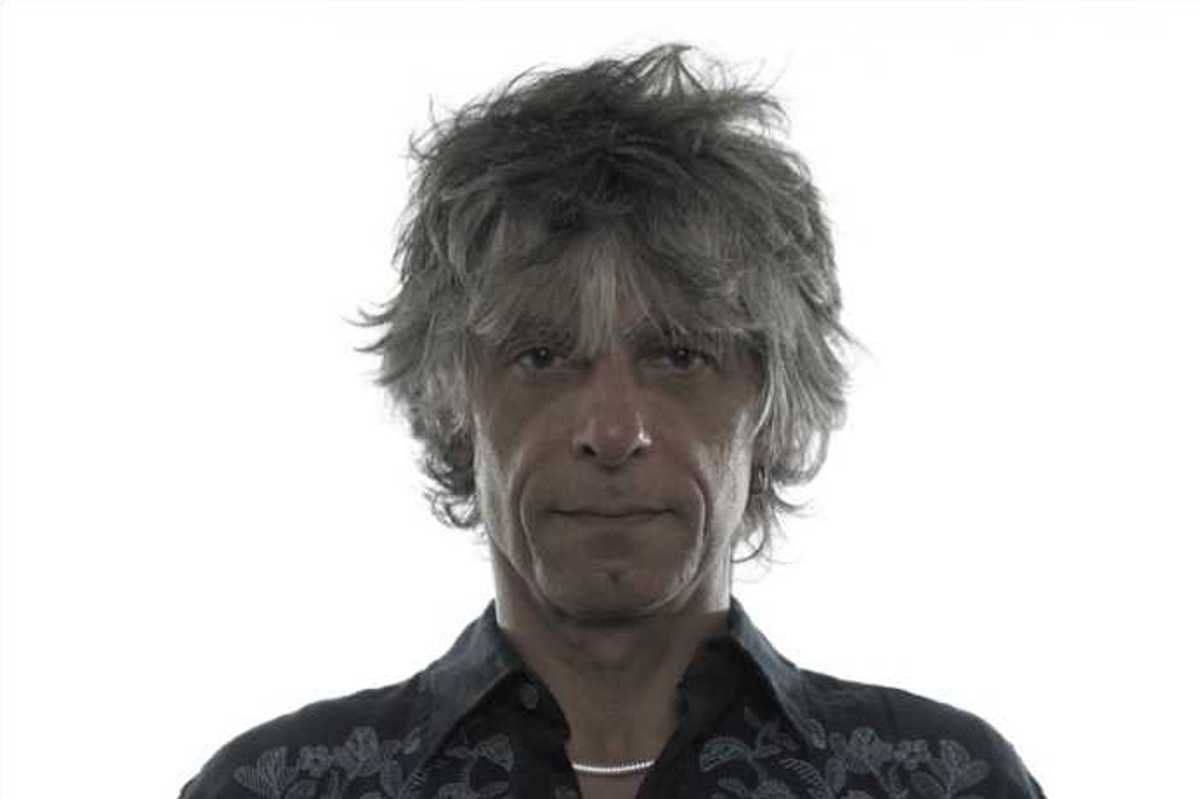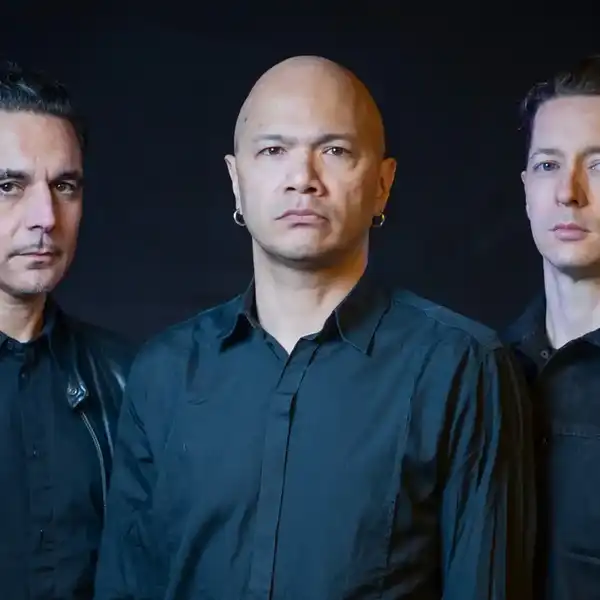Obituaries: Toronto Symphony Orchestra's Sir Andrew Davis, Toronto CFNY Radio Host James Reid
This week we also acknowledge the passing of jazz record producer and writer Michael Cuscuna and get a Canadian perspective on late Allman Brothers Band co-founder Dickey Betts.

Sir Andrew Davis Conducts The TSO 2018
Sir Andrew Frank Davis, an internationally-renowned English conductor, died on April 20, at age 80, of leukemia.
He was longtime chief conductor of the Toronto Symphony Orchestra, the Melbourne Symphony Orchestra and the BBC Symphony Orchestra.
Davis studied at the Royal College of Music and King's College, Cambridge, where he was an organ scholar, graduating in 1967. He later studied conducting in Rome with Franco Ferrara.
Davis' first major post was as associate conductor of the BBC Scottish Symphony Orchestra, beginning in 1970. In 1975, he became music director of the Toronto Symphony Orchestra (TSO). He held the post until 1988, and then took the title of Conductor Laureate with the TSO.
In 1988, Davis became music director at Glyndebourne, remaining there until 2000. In 1989, Sir John Drummond appointed Davis as chief conductor of the BBC Symphony Orchestra (BBC SO). Davis stepped down from that role in 2000 and from then held the title of Conductor Laureate of BBC SO.
In May 1992, Davis was appointed Commander of the Order of the British Empire (CBE) and in the 1999 New Year Honours he was appointed a Knight Bachelor.
Davis became music director and principal conductor of the Lyric Opera of Chicago in 2000, working there until the close of the 2020–2021 season.
In 2005, Davis became Music Advisor to the Pittsburgh Symphony Orchestra, for a designated three-year period. In June 2012, the Melbourne Symphony Orchestra named Davis its chief conductor, and he remained at that post until Dec. 2019. He conducted the Chicago Symphony Orchestra last December in the U.S. premiere of his own orchestration of Handel’s “Messiah.”
Davis performed a wide range of repertoire, with a particular focus on British composers, such as Michael Tippett, including the British premiere of his work The Mask of Time. Davis recorded for a number of labels, including NMC Recordings, Teldec and Deutsche Grammophon.
On April 22, The Toronto Symphony Orchestra (TSO) issued its statement of tribute. It reads, in part: "For 50 years, our Conductor Laureate Sir Andrew Davis never missed a season without appearing on the podium with the Toronto Symphony Orchestra. His consummate musicianship, unwavering devotion to our orchestra, and steadfast love for our city have impacted generations of musicians, audiences, and the broader TSO family and will continue to shape the identity of our community for generations. It is, therefore, with the utmost grief that we receive news of Sir Andrew’s death, who passed away in Chicago, Illinois, on April 20, 2024, at the age of 80, surrounded by his family."
"In 1975, he was appointed the TSO’s sixth Music Director, leading the orchestra until 1988 when he was named Conductor Laureate. Since his debut in 1974, he made annual appearances with the TSO for the next 50 years. Throughout this half-century, he conducted approximately 1,000 TSO concerts at numerous venues, including Massey Hall, Roy Thomson Hall and Ontario Place.
"Under Davis’s leadership, a historic tour to China took place in 1978, followed by festival tours including Edinburgh and the Proms. Especially meaningful to Sir Andrew was the orchestra’s far north tour, including Inuvik, North West Territories. He also conducted many TSO concerts in Carnegie Hall.
"Other significant milestones include the Great Gathering (a concert to honour Walter Homburger’s 25 years as Managing Director), 33 recordings (including 3 Juno awards and 2 Grammy nominations), and the opening of Roy Thomson Hall as the home of the TSO in 1982.
"He also supported young musicians throughout his career, establishing close ties with the Toronto Symphony Youth Orchestra, and encouraging the founding of the Toronto Children's Chorus in 1978, who performed frequently with the TSO. In addition to conducting, Sir Andrew also appeared in TSO concerts as organist, harpsichordist, and pianist, and served as an entertaining master of ceremonies and host (even in costume).
"Sir Andrew Davis was thrilled to share the stage with Music Director Gustavo Gimeno and the other former TSO Music Directors for the 100th season celebration: Maestros' Homecoming in April 2022.
"As we cherish the memories from half a century of music-making alongside Sir Andrew, we will also remember a man of generous spirit, a husband, a father, and a friend—our thoughts are with his son, Edward Frazier Davis. Our thoughts are also with the throngs of international artists, managers, current and former orchestra members from around the world who have been sending their condolences.
"In celebration of his long association with our city, a small street near the home where he lived was named Sir Andrew Davis Lane in 2018. We invite you to keep him in your thoughts the next time you walk past this street, or hear the TSO perform at Roy Thomson Hall. Rest in music, Sir Andrew Davis – and thank you."
Mark Williams, Beck Family Chief Executive Officer of the TSO, also shared a message. It noted that "Sir Andrew deeply touched the lives of musicians and audiences worldwide. Over the course of his remarkable career, he conducted symphonic, operatic, and choral repertoire with equal brilliance, and he loved music from all eras, from the Baroque to the wet-ink contemporary.
"His final concerts with the Toronto Symphony Orchestra were in November 2023, where he conducted Fauré’s Requiem, and the Canadian premiere of Mother and Child, composed by his son, Ed Frazier Davis.
"In our grief, we are profoundly grateful for Sir Andrew: for his musicianship, his leadership, and for his charm and humanity. There has been no greater, more devoted friend to the Toronto Symphony Orchestra than Sir Andrew Davis. He brought out the best in us, musicians and audiences alike. On behalf of the entire Toronto Symphony Orchestra, I would like to extend my sincere condolences to his son, Edward, and to all those who join us in mourning his loss, and celebrating his life and legacy. Rest in music, Sir Andrew Davis – and thank you."
Read an obituary in The Guardian here.
Dickey (Forrest Richard) Betts, Allman Brothers Band co-founder and singer-guitarist, died on April 18, at age 80, following a battle with cancer and chronic obstructive pulmonary disease.
A Billboard obituary notes, in part, that Betts was "an integral part of the Allman’s swampy, rambling Southern rock sound. He joined brothers Gregg and Duane Allman in 1969 in the group the siblings formed after splitting up their earlier band, the Allman Joys. Taking his place alongside drummers Butch Trucks, and Jaimoe and bassist Berry Oakley, Betts provided lead guitar as well as initially sharing vocals with Duane and Oakley before Gregg Allman stepped up to be the lead singer and primary songwriter.
"Betts did not have a songwriting credit on the band’s 1969 self-titled debut album — which featured a mix of blues covers and Allman originals. He first landed a few songwriting nods on the band's second album, 1970s Idlewild South. Along with his opening acoustic jam 'Revival,' Betts contributed a song that would become one of the band’s signature extended jam showpieces, the explosive, jazz-influenced 7-minute workout 'In Memory of Elizabeth Reed.'"
The deaths of Duane Allman and Oakley in 1971 and 1972 respectively rather derailed the group's career ascent. 1972’s hybrid studio-live album Eat a Peach included the Allman’s only top 10 Billboard Hot 100 single, the AM radio staple "Ramblin’ Man,” which rose to No. 2 on the charts. It was written and sung by Betts, Betts who also contributed lead and slide guitar and some lead vocals on the 1975 album Win, Lose or Draw. Betts’ 7 1/2-minute instrumental composition “Jessica,” recorded in 1972, became an FM radio staple.
The Allman Brothers split up and reunited a few times in the late '70s and '80s. Billboard notes that "three more Allman albums were released in the early 1990s, though Betts was not always on stage with the group when they toured later in the decade. He played his final show with the band in May 2000 at the Music Midtown Festival in Atlanta, after which he was fired for what the band dubbed 'creative differences.'”
The group was inducted into the Rock and Roll Hall of Fame in 1995 and received a lifetime achievement award from the Recording Academy in 2012. In 1996, they won their only Grammy in competition –best rock instrumental performance for a new recording of “Jessica” from An Evening With the Allman Brothers Band: 2nd Set. The group is considered a pioneer of the genre known as Southern rock.
Betts' solo discography begins with the 1974 album Highway Call (credited to Richard Betts), followed by Dickey Betts & Great Southern in 1977 and Atlanta's Burning Down in 1978.
Betts re-formed the Dickey Betts Band in 2000 and toured that summer. The band reassumed the name Dickey Betts & Great Southern and added Betts' son Duane (named after Duane Allman) on lead guitar. In 2005, Betts released the DVD Live from the Rock and Roll Hall of Fame. His final album release was Dickey Betts & Great Southern Official Bootleg Vol. 1 (2021), a two-CD live album of performances from the 2000s. Post-Allmans, Betts played solo and with his own band Great Southern, which included his son, guitarist Duane Betts.
Ken Dick is a Canadian rock drummer (Mount Nemo Rattlers) who befriended Betts. He offered this tribute to Billboard Canada: "As I sit here with my boys tonight reminiscing on Dickey and what he meant to me and in turn to them, we talked about the time they finally got to see him play live at Peach Fest a few years back. We were backstage watching him play, now later in his years, however as the set continued, I found myself watching my boys in awe of his commitment to the songs and his part in them. This brought a wry smile to my face as it reminded me of myself many years earlier. The Allman Brothers Band were a band that blew minds with the musicianship, collaboration and the incredible feel they all had for each other regardless of the configuration of the band at the time.
"I met Dickey quite a few times over the years, but more recently while working with Devon Allman and then with the Allman Betts Band which featured both Devon and Duane Betts, Dickey's son, who played with his Dad in his solo bands for years. Duane is a friend that I have gotten to know well over the years and can say that he was very devoted to his Dad.
"I first saw Dickey back in 1979 with the Allman Brothers at the Memorial Auditorium in Buffalo and a few songs into the show they played 'Blue Sky'" Dickey's ode to his second wife, Sandy Bluesky Wabegijig. The guitar interplay with Dan Toler was mesmerizing (this coming from a drummer) and I was hooked.
"The songs he wrote for the ABB were some of most incredible compositions I have heard still to this day. As a solo artist he continued to pen timeless gems like /Atlanta’s Burning Down,' 'Long Time Gone,' 'Nothing You Can Do,' 'Duane’s Song' and 'Bougainvillea' among many others. For me, more than 150 ABB shows later, I can say that I have never been disappointed at any ABB show and while Dickey left in 2000, I continued to go see him and his solo bands until he stopped playing live a few years back."
"In honour of Dickey, my boys and I jammed a little tonight, listened to some of his great work from all eras and then toasted his life and what he left us all with. I am grateful to have known him and his family and to experience his incredible contribution to music over the last 50+ years through his songwriting, guitar playing and his one of a kind personality. My heart goes out to the entire Betts family and the extended ABB family. RIP Ramblin’ Man."
Read tributes to Betts from fellow notable artists here.
Michael Cuscuna, an American jazz record producer and writer, died on April 20, at age 75, of cancer.
He was the co-founder of Mosaic Records and a discographer of Blue Note Records, and he won three Grammy awards for his work.
In the '60s, he had a jazz radio show and wrote for Jazz & Pop Magazine and Down Beat. After a stint as a progressive rock DJ, he took a position as a producer with Atlantic Records, going on to record such artist as Dave Brubeck, the Art Ensemble of Chicago, Bonnie Raitt (Give It Up), McCoy Tyner and Chris Smither.
He also worked for other labels, and, from 1975 to 1981, he searched the Blue Note archive for previously unissued sessions which began to be issued during this period.
He co-founded Mosaic Records in 1983 specializing in jazz reissue box sets sold by mail order, featuring such major artists as Thelonious Monk, Miles Davis and Nat "King" Cole, alongside lesser known artists. In 1984, Cuscuna became a special consultant, producer, and reissue director of Blue Note Records.
Cuscuna won three Grammy Awards for his releases, two for Best Historical Album (Nat King Cole and Billie Holiday) and one for Best Album Notes (Miles Davis).
James “JR” Reid, a radio host on famed Toronto station CFNY, died on April 12, at age 73, of leukemia.
An obituary in The Toronto Star observes that "Jim was most passionate about music and the highlight of his career was working at the beginning of CFNY 102.1, in the little yellow house in Brampton during the original Spirit of Radio era. As we keep him in our thoughts, these are some words from one of his favourite songs by Todd Rundgren, "Light of the World, Shine on me. Love is the answer Shine on us all. Set us free. Love is the answer."
In a post on his A Journal of Musical Things, Alan Cross paid tribute to his late CFNY colleague. "When I first arrived at CFNY on October 3, 1986, it was about noon. One of the first people I was introduced to was JR, the midday announcer. He was warm and welcoming and, frankly, I intimidated by how well he knew the CFNY’s 20,000 album library.
"This was back in the day when all CFNY people had to pick their own records. JR, for example, decided one day that he was only going to pick songs from artists with names that began with the letter C. He took it as a challenge. Could you create engaging, nicely flowing sets of music with that self-imposed restriction? JR could.
"Jim lost his CFNY job in 1988 as part of a restructuring during one of the station’s many budget crises. But our paths would cross occasionally in the following years after he changed careers. You’ll see him in the upcoming CFNY Spirit of Radio documentary that’s due later this year. He was a lovely, gentle man."
A Celebration of Life was held on April 19 in Mississauga. The family welcomes donations to The Leukemia and Lymphoma Society of Canada.
Listen to a Toronto Mike'd podcast dedicated to Reid here.

















